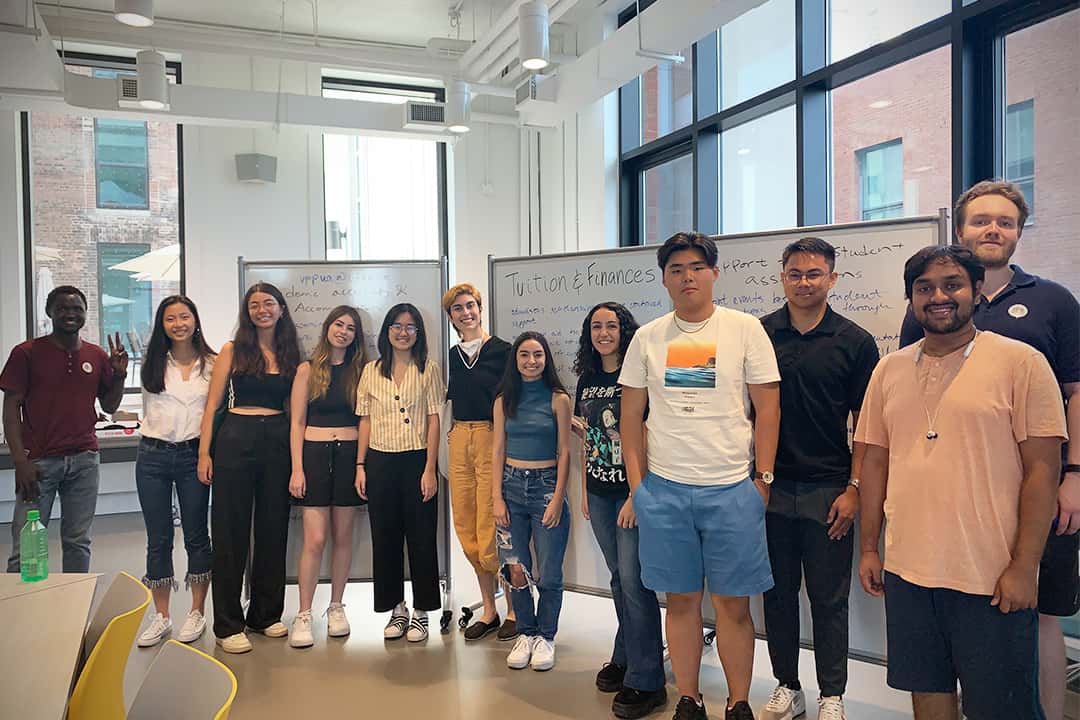On August 20, the University of Toronto Students’ Union (UTSU) and the International Students Association Network (ISAN) hosted an international students’ conference. The event provided an outlet to discuss problems that are faced by international students at U of T.
Speeches from the panel
The conference began with a series of speeches from the speakers’ panel.
The first speaker was Alyanna Denise Chua, an international student from the Philippines. In March 2022, Chua published a three-part investigation in The Varsity about struggles faced by international students at U of T.
Chua began by discussing why so many international students choose U of T to pursue their postsecondary education. “For many international students, especially those from the Global South like me, attending U of T is an answer when faced with a sense of choicelessness back home — a sense that back home, you won’t be able to reach your full academic and intellectual potential because of home’s weakened education system.”
Chua’s speech focused on U of T’s reliance on international tuition as a source of revenue.
With the provincial government having frozen domestic tuition every year since the 2020–2021 academic year, U of T has increased its reliance on international tuition. Most recently, in March, the Governing Council approved a two per cent increase to international tuition fees.
Chua believes that a solution to this problem must involve collaboration between U of T administration, student unions, and international students. “U of T’s budget has the lowest proportion of government funding among all Canadian universities, which is partly why U of T has to rely so heavily on international tuition. The public education system is ultimately up to the province, so we can think about collaborating with the unions and U of T admin to lobby the province of Ontario to increase funding [for universities].”
Victoria Liu, UTSU’s vice-president public and university affairs, also addressed this trend. She explained that the UTSU is attempting to lobby the provincial government to increase funding for postsecondary schools instead of going after the university itself.
In her speech, she also addressed the importance of connecting international students, and went over the UTSU’s current and future plans on behalf of international students. Besides tuition, she affirmed that the UTSU is looking into finding more job opportunities for international students and increasing need-based scholarships.
These issues were also addressed by Anna Carneiro and Luise Hellwig, coordinators from the ISAN.
To address some of the challenges faced by international students at U of T, the ISAN has created a handbook. The handbook provides information about life in Toronto, managing finances, and job opportunities, as well as guidelines for applying for Canadian immigration.
Discussion with the attendees
After the speeches and an hour of break and mix-and-mingle time, the event moved into a discussion involving the hosts of the event and the international students present.
The importance of creating a bigger community of international students was addressed numerous times throughout the event.
Since many international students face difficulties finding community in Canada, and there are many challenges specific to international students, attendees agreed that fostering a connection between these students is very important. In order to unify the international student community, the attendees formulated some ideas for events that can be organized between cultural groups on campus, or even by the ISAN and UTSU.
Other topics discussed included tuition and finances as well as accessibility and accommodation issues, such as difficulties getting assistance from the registrar, language barriers, and unhelpful instructors.
UTSU and ISAN’s plans
In an interview with The Varsity, Liu reflected on the conference.
She said that the event was important to foster a community between international students and hear their needs directly from them in order to improve advocacy for them. “This year, I want [the] UTSU to be really front-facing. So whenever we do advocacy… suggestions and policies need to come from the students, and really what’s best for the [international student] body.”
She also affirmed that the UTSU has advocated and continues to advocate for international tuition reduction by lobbying the university and the provincial government to increase university funds.
The union will also continue to advocate for need-based scholarships as well as more job opportunities for students that can help students experiencing financial difficulties. The union also hopes to help international students navigate the process of filing their Permanent Resident application — a status granted to individuals who permanently live in Canada, but do not have citizenship.
Carneiro also expanded on the importance of the event in an interview with The Varsity. She suggested that this conference was not only an opportunity for students to discuss issues that affect them, but also to “create something together.”
She also affirmed that this event was important so that incoming international students continue to reflect on these issues.
Carneiro emphasized that the hardships faced by international students go beyond what was discussed during the conference: “The pressure to perform, the pressure to be more competitive than domestic students, the pressure to live up to the tuition that you pay, the pressure of being an immigrant… So I think all of the extra weight on an undergrad student is the main challenging thing.”
Carneiro also shared that the ISAN’s continuity is uncertain, as most members have graduated, but that it isthey are still looking for a new executive team, and willing to do another conference like this in the future.
Disclosure: Alyanna Denise Chua is currently a member of The Varsity’s staff and was an Associate Features Editor in 2021–2022.


